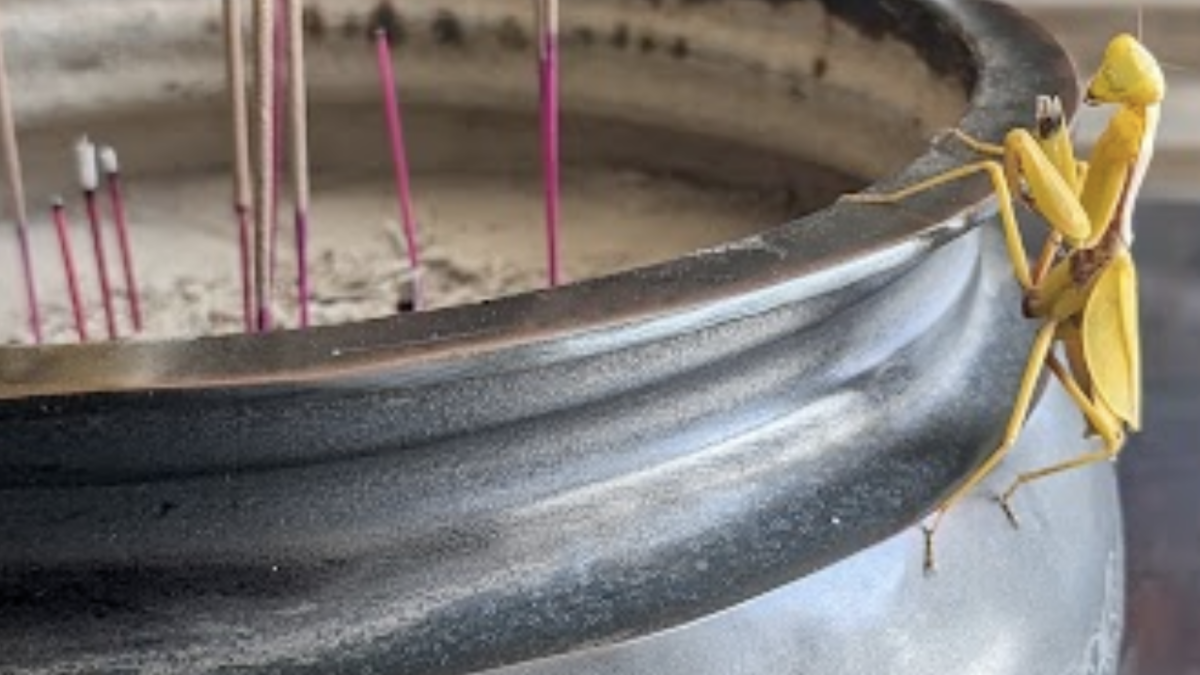Photo: Stuart Young. From Miaoguang Temple 妙光寺 in Taipei
Speakers: Daniel Burton-Rose (Wenzhou-Kean University), Stuart Young (Bucknell University)
Date & Time: December 2, 2024, 4:30 pm – 6:00 pm
Venue: 202 Jones, Princeton University
Abstract:
From the silkworms that serve as a synecdoche for civilization itself to the locusts that periodically ravage agricultural society, the multifarious little creatures known as chong 虫/蟲 contributed to the development of Chinese religious teachings, practices, and material cultures in myriad ways. In today’s lecture the editors of the first anthology to focus on chong in Chinese Religions address the challenges and opportunities of combining inquiries into Buddhism, Confucianism, Daoism and popular religions with Animal Studies and Environmental History. Of particular concern is what centering chong contributes to the growing body of scholarship seeking to decenter anthropocentric perspectives. Such works often use life sciences and (neo-)materialism to access non-human creatures. What happens, the editors ask, when the “more-than-human” includes silkworm deities and body worms that report sins to Heaven? The answer lies, in part, in a materialist conception of religion imaginaries and the conditions that give birth to them. In contrast to the emphasis in existing scholarship on domesticating, breeding, consuming, harvesting, sacrificing, exterminating, categorizing, and symbolically appropriating non-human animals, the editors emphasize the way in which chong have created the conditions in which Chinese civilization and religious lifeways have unfolded.
Speakers:
Daniel Burton-Rose is an Assistant Professor of History at Wenzhou-Kean University. He obtained his doctorate from the Department of East Asian Studies at Princeton University in 2016. He is the co-editor, with David A. Bello, of the anthology Insect Histories of East Asia (University of Washington Press 2023) and the author of Conversing with Spirits: Prophecy and Spirit-Writing in Qing Conquest China, which is under contract with University of Hawai‘i Press. He serves as the Senior Editor of the journal Asian Medicine: Journal of the International Association for the Study of Traditional Medicine (Brill), for which he co-edited a special issue with Yi-Li Wu titled “African American Contributions to American Acupuncture,” and has contributed to a range of peer-reviewed scholarly journals, including Daoism: Religion, History and Society, Journal of the European Association for Chinese Studies, Journal of the History of Biology, Journal on Religion and Violence, Korean Journal for the History of Science, and T’oung Pao.
Stuart H. Young is Associate Professor of East Asian Religions in the Department of Religious Studies at Bucknell University. He is author of Conceiving the Indian Buddhist Patriarchs in China, Kuroda Institute Studies in East Asian Buddhism no. 24, University of Hawai‘i Press, 2015 (paperback 2023). For the past several years he has been studying silk uses and sericulture practices in premodern Chinese religions, which has led to his current interest in silkworms as agents of religious change. While he has more recently turned to Daoist sericulture rituals, his work on silk and silkworms in Chinese Buddhism has appeared (or will soon appear) in the Journal of Chinese Religions, Asia Major, Journal of the International Association of Buddhist Studies, and History of Religions.
See the original event posting here.

